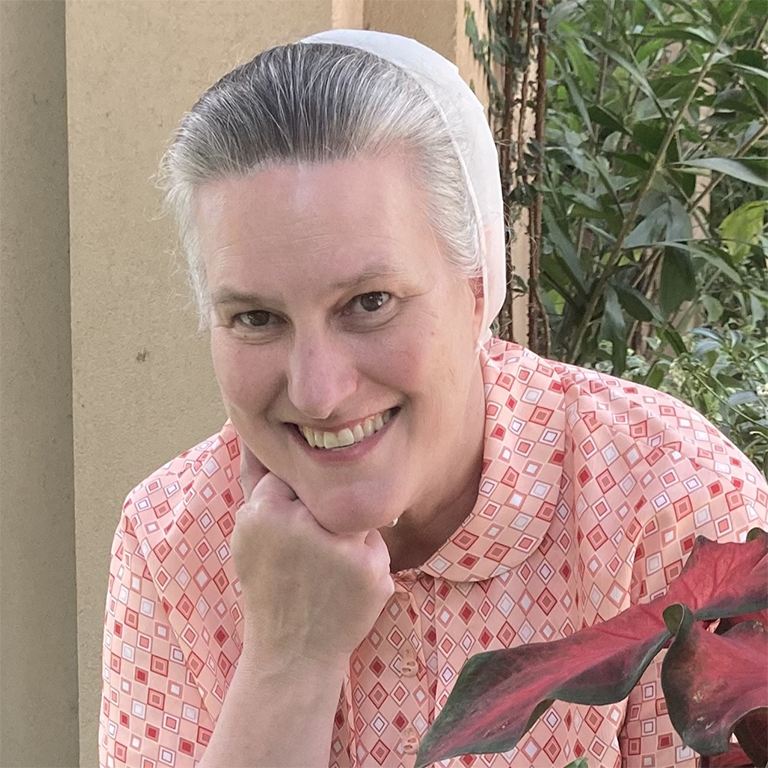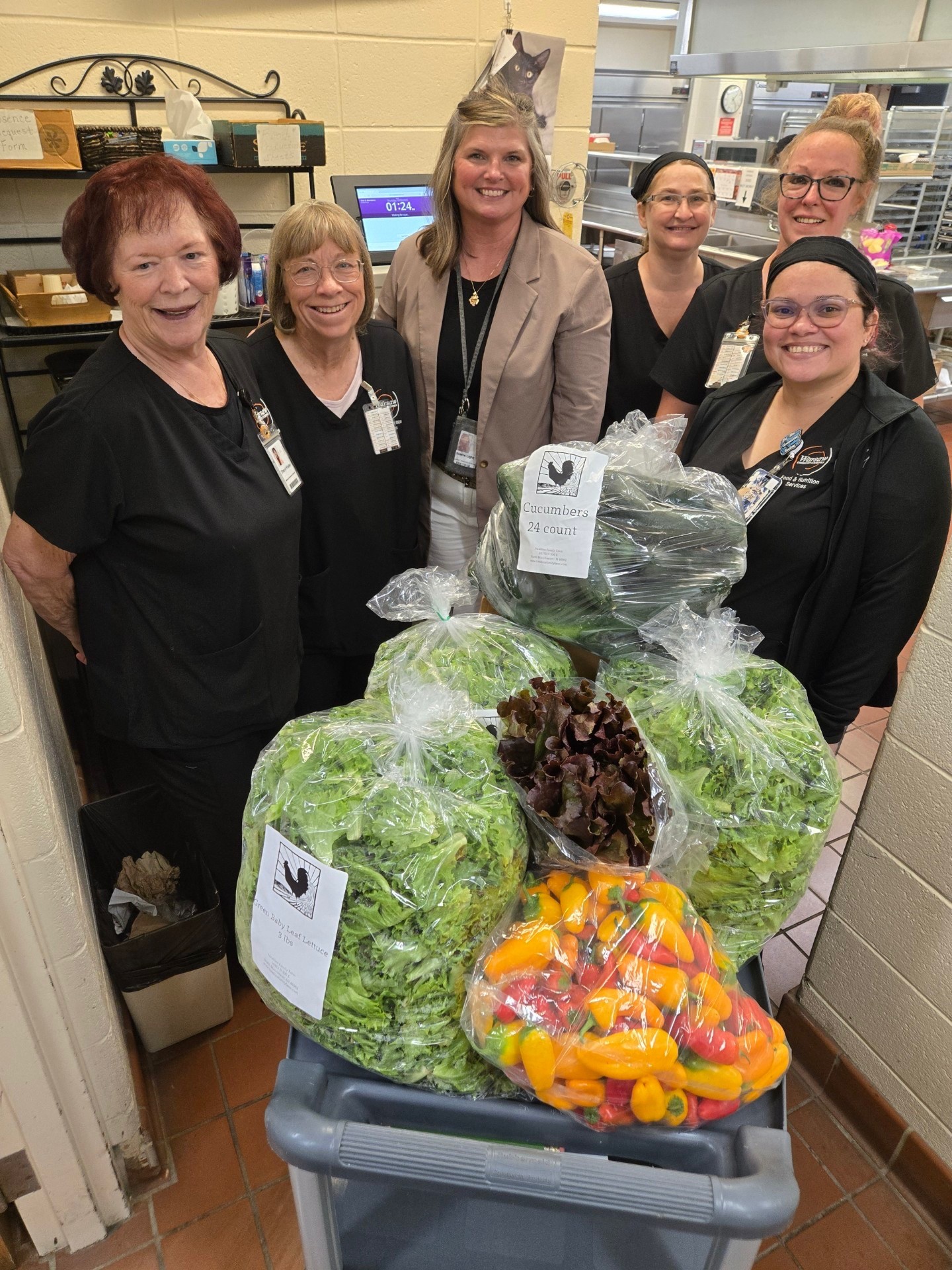Becky Landes - featured Food Systems Practitioner
Becky Landes creates opportunities for Indiana farmers to sell directly to Indiana schools. Today, her work is described as "value chain coordination" and "farm-to-school procurement." But Becky began doing this work long before those terms came around.
She's known many of the farmers she works with for a long time. Having grown up in rural Northeast Indiana, Becky sees them in town, runs into them at the grocery story, or goes out to meet them at their farms. They are her neighbors and her friends.

For decades, she has pioneered and promoted a farm-to-school program designed to connect local agriculture to local schools throughout Wabash County and neighboring counties in Indiana.
In February 2025, Becky began working with FARMWISE Indiana as one of six Regional Value Chain Professionals with Indiana University. Her role expands local food procurement, planning and preparation for K-12 schools throughout the state. It is work that weaves relationship building around a complexity of legal and technical operations.
Becky notes: "I live in a rural community, so sometimes it's challenging to figure out who is going to distribute and deliver local food to local schools. How do we get food from point A to point B? That was one of the first barriers! But now, 15 years in, I've done enough 'marketing" - if you'd call it that - and getting the word out." Eventually, many farmers she knew approached her to ask if they could sell their produce and meat to schools.
Becky illustrates her typical workweek. First, she touches base with a local farmer who has something to sell: "snack peppers," for example. Then she reaches out to a school district to discuss the possibility of a certain school within that district purchasing these peppers from the farmer while the are in season. Then they talk volume; in this case, "about 200 pounds per week, all grown on less than an acre of land." Knowing what a school cafeteria can make good use of - and how much they'd need to do so - is essential to her work. Understanding the scale and limitations of what an Indiana family-run farm can grow is equally important.
She notes: "Instead of focusing on producing 20,000 acres worth of a single crop for industrial use, local farmers are only growing enough peppers for a single school district," demonstrating a system that is no only sustainable, but also smart." With the money that farmers can earn by selling to schools, she explains, they can go to the local hardware store and purchase equipment and tools to help them grow more sustainably.
Knowing what a school cafeteria can make good use of - and how much they'd need to do so - is essential to her work.
Understanding the scale and limitations of what an Indiana family-run farm can grow is equally important.

Becky also brings expertise in navigating USDA regulations. She helps farmers adhere to standardized guidelines, as "what is good for their own family many not be good for every single family." Helping farmers improve and become more aware of their own farming practices in order to meet school system standards is an essential part of Becky's role.
Of course, there are always challenges, but Becky and her team have already solved numerous problems related to farm-to-school programming. "Sometimes, farmers don't have enough food for a whole school district, so then we have a conversation and let the farmers know that they can start off with a single school to reduce overwhelm on all ends."
In dealing with the technical side of things, Becky never forgets her why - her passion for cooking, nutrition and food awareness are all a byproduct of her upbringing. As someone who grew up on a farm with a love for cooking, she shares her enthusiasm for healthy food generously. "I want kids to have access to good food!"
"When you cook good food during lunches, more students eat lunch," she notes. "Soon, the kitchen staff starts noticing the amount of kids that say 'thank you' and that this was their favorite lunch, and that has an impact. Eventually, the lunch staff gets involved in educating the children about food."
"Teaching children that the food they eat was grown on a local farm in a sustainable way encourages them to continue health food habits. It gets them away from ultra-processed foods," Becky says as she explains the process of making lasagna from scratch. "There's was a phrase thrown around along the lines of 'We're not really lunch ladies anymore. We're lunch teachers.'"
Becky and her team also conduct direct, one-on-one conversations with students to ask them what they want to see on the menus. She explains that, no, they can't have chicken nuggets or pizza every day, but they could have a specific day dedicated to waffles, for examples.
Becky even checks the trash cans to see what the kids actually ate and what they didn't. She considers this her "raw data." Such down-to-earth details help her and her team craft menus that the kids want without sacrificing nutritional value.
Becky's farm-to-school initiatives have had an undeniable impact on local farmers and schools in her community and beyond. In fact, Indiana Governor Mike Braun recently signed an executive order to bring more local food into schools, scaling what Becky is already doing. Still, she laments that Indiana is behind in some aspects. More money is required to actually execute policies in favor of local food procurement, she explains.
"An average school across the nation can only spend $2.25 on food costs for lunch and we spend more on our coffee," she reports. "Yes, we need people to formalize our intentions into policies, but now the question is how do we make these policies executable? How do we turn a plan into progress?"
Becky is a firm believer in the idea that if her local farming community did not exist, if her town were dependent only on the industrialized global food system, their community would be in trouble. When the COVID 19 pandemic caused food scarcity on grocery store shelves in many part of America in 2020, it didn't happen in Becky's rural farming community. She explains that as the ties between schools and farmers strengthen, the community overall grows more resilient.
Becky has always been accustomed to eating home-grown food. It was - and is - simply a part of her life. Not everyone grows up on a farm, she acknowledges, but everyone can share a similar appreciation for good food and the farmers who grow it. She actively spreads that gratitude by dismantling the disconnect between school children and their meals, one vegetable at a time.
PHOTOS CREDITS: FARMWISE INDIANA
Top right photo: Becky Landes
Bottom left photo: School food colleagues of Becky's, purchasing lettuce and other produce from Hawkins Farm for Warsaw Schools in Indiana.
Author: Durjoy Bhadra | November 4, 2025

About the author:
Durjoy Bhadra serves as a work-study student employee for NAFSN during the 2025-2026 while completing his undergraduate education at Cornell University. With an interest in Nutrition Science, he lets his passion for food systems and nutrition guide his work at NAFSN.
LANGUAGE ACCESSIBILITY: